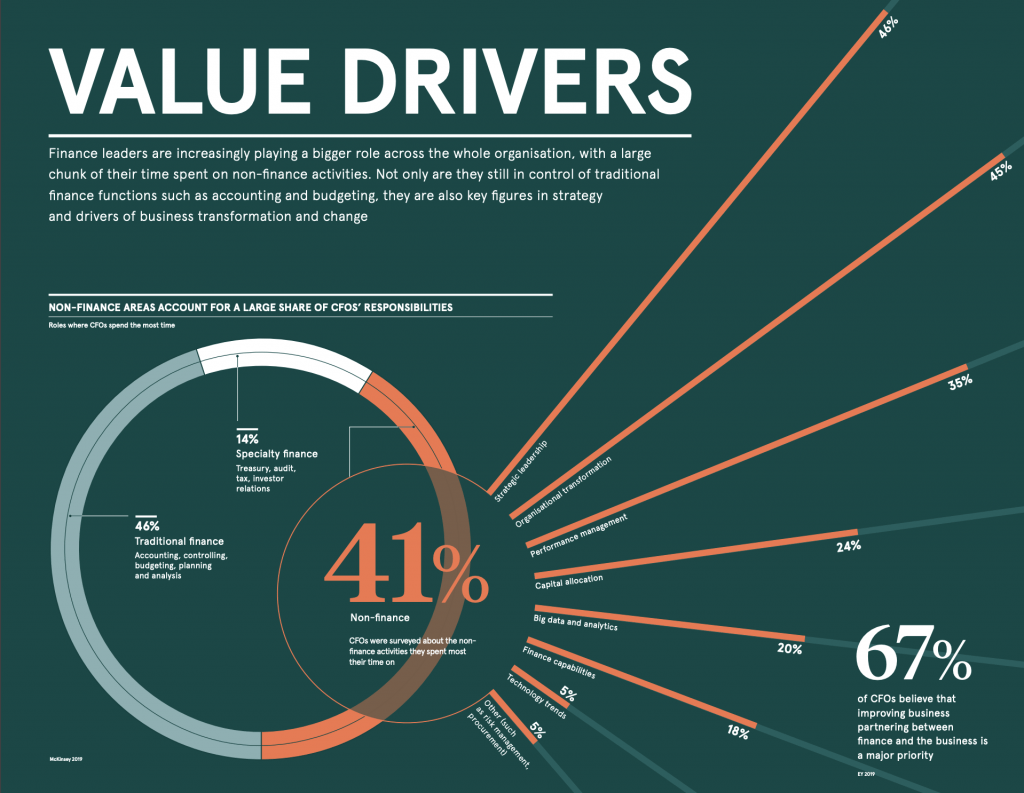The CFO – An Evolving Role With An Increasing Scope

In this era of data-driven business and decision making, roles and responsibilities within a company are shifting. More focus on data analysis, forecast and performance analysis to make informed decisions mean that the role of the CFO is becoming more and more integral to operations.
Traditionally, a CFO would be associated with areas such as accounting and financial controlling, or with leading due diligence throughout an M&A operation. While those responsibilities remain, 41% of CFOs reported spending the majority of their time on non-finance related activities, leading the team towards data-driven strategic decisions, as revealed in an infographic from Raconteur.
According to Visual Capitalist, the scope of a CFO’s responsibilities has increased massively thanks to advancement in technology and data science. This, on the one hand, took off some of the legwork from the CFO thanks to more efficient accounting tools and, on the other hand, opened up the possibility of using large amounts of data to make accurate forecasts resulting in informed strategic decisions.
This way, the CFO started becoming more of a strategic leader than a controller and enforcer of financial compliance. By using data and financial forecasts, CFOs can accurately evaluate performance across departments and, in doing so, give strategic direction to the business operation to maximise returns and ensure sustainability.
In a global survey carried out by McKinsey, CFOs were asked about the scope of their responsibilities. 41% of them reported spending a majority of their time taking care of non-finance activities, which were distributed as follows.

Even though the data suggests that high-level leadership and steering the business’ direction takes up a significant fraction of a CFO’s time, other business leaders and executives still don’t seem to recognise that.
In the same survey from McKinsey, CFOs and non-financial executives were asked about the areas where a CFO delivers the highest financial value. The answers each gave were very different, with the non-financial executives’ views being very skewed towards the traditional perception of a CFOs role.
In their research, McKinsey outlines three possible ways to fix the disconnect between CFOs and other executives.
1. Leading Company-Wide Transformations
One of the main areas of focus within the expanded role of the CFO consists in leading strategic business transformations. For example pivoting to fix a flawed business model, or reorganising the cost structure to achieve a higher profit margin.
These transformations are driven by data and financial forecasts, but affect the business as a whole including the day-to-day operation in various business units.
Setting data-driven goals for business units or even specific team members can be a great way for the CFO to gain and retain control over the transformation process. It not only allows them to establish themselves as the leader of such change, but also helps them collect new internal data to be monitored and analysed in order to measure outcomes.
2. Implementing Digitisation And Automation
Automation and digitisation of systems and processes is strictly related to a company’s financial monitoring and control system. On the one hand it helps save costs and standardise service levels, on the other hand it constitutes an additional source of structured data that a CFO can use to build more accurate models and forecasts.
This is why the CFO is often the one to initiate the transition towards automated processes within a company. Since many of the processes that can typically be automated are outside of the strictly financial area, implementing such processes can be useful for a CFO to expand their scope beyond their traditional role.
3. Training And Developing Talent Internally
Since the financial leadership role of a CFO is not limited to accountancy and financial compliance anymore, the CFO’s skillset needs to reflect that, with an increased focus on analytical skills needed to interpret and manipulate data to infer actionable insights.
As data becomes increasingly intertwined with almost every business function, the CFO’s skillset is increasingly valuable and transferrable. This means that the training and development of non-financial professionals from the CFO has potential to add substantial value to their own respective sectors.
The information available on this page is of a general nature and is not intended to provide specific advice to any individuals or entities. We work hard to ensure this information is accurate at the time of publishing, although there is no guarantee that such information is accurate at the time you read this. We recommend individuals and companies seek professional advice on their circumstances and matters.




